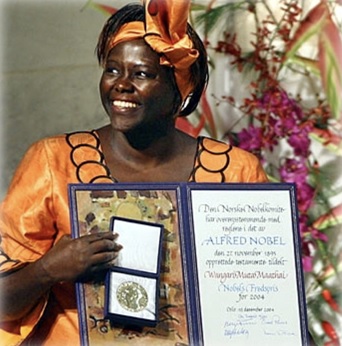Wangari Maathai, Nobel Peace Prize Laureate
Full excerpt of the section on Wangari Maathi (1940-2011) from Pro-Life Feminism: Yesterday and Today.
(all sections contain an introduction and at least one document)
Introduction by Mary Krane Derr
Wangari Muta Maathai, globally acclaimed environmentalist, human rights campaigner, feminist, and 2004 Nobel Peace Prize recipient, was born in 1940 to a farming couple in a rural area of Nyeri, Central Province, Kenya, near wildlife-rich Mount Kenya. The young Maathai was already sensitive to the start of disturbing changes in the landscape she loved deeply: the replacement of small, eco-friendly farms and forests with commercial monoculture plantations, the drying up of clean, abundant water, soil erosion, the disappearance of familiar plants and animals. Over the past 150 years, possibly 75% of Kenya’s forest cover has been destroyed, first by Anglo colonialists, then wealthy plantation owners and the poor Kenyan farmers they have squeezed out and made desperate for fuel, arable land, food, and water.
In 1960, Maathai was awarded scholarships to study in the United States. She earned a B.S. and M.S. in biology (Mount Saint Scholastica College, 1964, and University of Pittsburgh, 1966, respectively). Her Ph.D. in anatomy (University of Nairobi, 1971) made her the first East African woman to achieve a doctorate. From 1973 to 1980, she directed the Kenyan Red Cross. In 1976, she was appointed chair of the Department of Veterinary Anatomy, University of Nairobi. During the late 1970s, as a leader of the National Council of Women of Kenya, she was deeply affected by the laments of rural women over the countryside’s accelerating degradation, which deprived them more and more of healthy diets, farming income, drinking water, firewood, shelter, and kinship with the living world and one another. In 1977, Maathai founded the Green Belt Movement (GBM), which has pioneered a home-grown approach to overcoming these threats against poor women and their families, and against the ecosystem at the same time: hiring the women to plant and nurture trees.
During the early 1980s, Maathai’s husband left her and their three children, Waweru, Wanjira, and Muta. A judge granted him a divorce on the grounds that she was “too educated, too strong, too successful, too stubborn and too hard to control.”2 Maathai told the judge that he was incompetent, and he sentenced her to a night in jail. She persisted as leader of the Green Belt Movement despite this and numerous other run-ins with Kenyan authorities, especially the heavy-handed, thoroughly corrupt regime of President Daniel arap Moi. Moi and his associates derided her as a “national menace” and an “un-African”—because outspoken and unsubmissive— woman. The nonviolent Maathai endured further arrests as well as death threats and injuries from beatings. Moi has since fallen from power, but the Green Belt women can now celebrate three decades of accomplishment.
Within Kenya, over 600 GBM community groups have planted over 30 million trees in both rural and urban settings, in the process schooling “ordinary” citizens, especially women, in political advocacy skills and inspiring parallel activism in other Two-Thirds World nations. Most recently the GBM has ventured into personal and community empowerment through sexual and reproductive health education in the facts and decision-making skills surrounding abstinence, voluntary family planning, and HIV/AIDS prevention.
Maathai continues to serve on GBM’s board, and those of the National Council of Women of Kenya, the United Nations Advisory Board on Disarmament, the Earth Charter Commission, Green Cross International, and the Women and Environment Development Organization, among others. In 2002, Moi’s abdication made free democratic elections possible, and Maathai resigned as GBM leader to run for office. From 2002 to the present, Maathai has served as Member of Parliament for her hometown district, and since 2003 as Kenya’s deputy environment minister.
The list of Maathai’s honors grows ever longer: the Goldman Environmental Prize (1991), the United Nations Environment Programme Global 500 Hall of Fame (1991), the UN Africa Leadership Prize (1991), the Jane Addams Leadership Award (1993), the Golden Ark Award (1994), the Kenyan Community Abroad’s Excellence Award (2001), the Republic of Kenya’s Eldership of the Burning Spear (2003), the Conservation Scientist Award (2004), the Petra Kelly Environmental Prize (2004), and the J. Sterling Morton Award of the National [U.S.] Arbor Day Foundation (2004), to name only some. In late 2004, Maathai was granted the Nobel Peace Prize, becoming the first African woman ever to achieve a Nobel of any kind. On hearing the news, Maathai planted a Nandi flame tree at the foot of Mount Kenya. She asked admirers around the world to celebrate this honoring of the GBM women and to “secure the future for our children” by planting trees also.
Maathai often says: “What we do to the Earth, we do to ourselves.” These words express her wisdom—drawn from both modern scientific and ancestral knowledge—about many issues, including abortion and its relationship to female disempowerment. The article below comes to us from Lifesitenews (www.lifesite.net), affiliated with Canada’s Campaign Life Coalition.
“Abortion Is Wrong,” Says Nobel Peace Prize Winner
by Lifesitenews (e-mail release, December 7, 2004)
OSLO, NORWAY—Kenyan Nobel Peace Prize winner, Mrs. Wangari Maathai, said “abortion is wrong” in a conversation with Norway’s Dagen newspaper reporter Jostein Sandsmark Tuesday. Professor Maathai is Kenya’s deputy minister of the environment.
“But I am trying to avoid condemning the victim,” she said, referring to the pregnant mother who seeks an abortion. She sees both mother and child as casualties: “Both are victims. There is no reason why anybody who has been conceived, shouldn’t be given the opportunity to be born and to live a happy life. The fact that a life like that is terminated, is wrong,” said Maathai.
“When we allow abortion, we are punishing the women—who must abort their children because their men have run away—and we are punishing the children whose life is terminated,” she continued. “But it is because we are not willing to put the men where they should be, and that is taking up the responsibility.”
“I want us to step back a little bit and say: Why is this woman and this child threatened? Why is this woman threatening to terminate this life? What do we need to do as a society? What are we not doing right now as a society? A part of that answer lies in this House,” Maathai said, pointing at the Kenyan Parliament building. While abortion is still illegal in Kenya, Maathai suggests going further— that the 1960s law making fathers financially responsible for any children they conceive be re-instated.
“That law was removed by men in this Parliament,” she emphasized. “Now I think we are too lenient on men. We have almost given them a license to father children and not worry about them. That is part of the reason why women abort, because they do not want to be burdened with children whose fathers do not want to become responsible.”
Maathai will be awarded the Nobel Prize in Oslo Friday for her involvement in fighting for the environment, human rights and women’s rights.
———————————————–
For more of our posts on environmentalism, see:
Stewardship and the Consistent Life Ethic
Climate Change and the Consistent Life Ethic: An Opportunity to Connect Issues
Lethal from the Start: Uranium Mining’s Danger to the Most Vulnerable
Threats to the Unborn Beyond Abortion
For more of our posts from Mary Krane Derr (d. 2012) see:
Elizabeth Cady Stanton (another excerpt from the same book)
Progressive Prolifers at the Progressive Magazine 100th Anniversary Celebration
Ancient Roots of the Consistent Life Ethic: Greece
Women’s History Month: Jane Addams



Leave a Reply